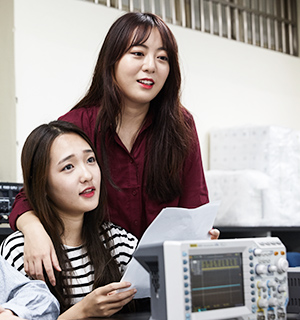
The Department of Electrical Engineering adopted the ABEEK (Accreditation Board for Engineering Education in Korea) system in 2002 and has continuously advanced and improved its curriculum in the last 10 years, building an original renewable energy technology development center and participating in Korea Electric Power Corporation’s ‘Fundamental Workforce Development Project’, the ‘Capacity Building Project for Universities’ IT Departments’ of the Ministry of Information and Communications and the ‘Electric IT Workforce Development Project of the Ministry of Knowledge Economy. The Department relies heavily on the idea of ‘back-to-basics’ and is focused on producing electric engineering specialists that have comprehensive perspective, practical mindset as well as a sound knowledge in basics and specific concepts.
Location : Rm.214, Bima Hall
Tel : 82-2-940-5140
Fax : 82-2-940-5141
e-mail : piaozaixi@kw.ac.kr
Website : http://electric.kw.ac.kr/
Course Descriptions
Electric/electronic circuit Lab. 1
This course covers the verification of basic circuit theory and fundamental principles in Electrical Engineering, and helps students become familiar with the operation and manipulation of basic measurement instrumentations and equipments.
Electric/electronic circuit Lab. 2
This course covers experiments on electric machinery(ac and dc motors/generators, transformers) and basic electronics including transistor amplifiers and digital logic circuits.
Electromagnetics 1, 2
This course is designed to study the basic concepts of electromagnetics and fundamental theories of electromagnetic phenomena, as well as enhance capability of handling mathematical tools for representing electromagnetic theories. The course also gives a lecture on the principles of electromagnetic field theory, boundary problems, Maxwell's equation, etc.
Electric Circuit Theory 1, 2
This course covers the basic electric circuit theory and analytical technique : in particular, direct current circuit, alternating current circuit, electrical transients, resonances, and the applications of Laplace and Fourier transformation, etc.
Electronic Circuits 1, 2
This course covers analysis and design of basic electronic circuits - diode circuits, bipolar junction transistor circuit, field effect transistor circuits, operational amplifiers and their applications, power supplies, etc.
Circuit Analysis and Logic Circuit Lab.
This course covers basic concepts of an automatic control, and signal processing is studied by measuring the signal variable and obtaining transfer function. Basic logic design and experiments are also performed.
Power Apparatus and Microprocessor Lab.
This course conducts experiments to obtain the basic characters of electric machinery and power apparatus. Basic skill for a microprocessor application is also considered.
Electric Machinery 1, 2
his course covers the concept of energy conversion between electrical energy and mechanical energy, as well as fundamental principles underlying the rotating electric machines(dc generators/motors, synchronous generators/motors, induction motors, etc) and transformers.
Design of Electrical Installation
This course covers practical techniques on the design, application, and installation of various electrical devices and equipments.
Electrical Installation Engineering
This course covers cost concept of electrical system and basics of the intelligent building. Small scale of electrical system installation is also considered.
Control Engineering 1, 2
This course covers modelling and representations of linear systems including state space and transfer function representations of dynamic systems. The time and frequency domain analysis, stability criteria, and design techniques of linear systems are also covered.
Microprocessor Applications
General concepts of microprocessor are investigated. Common microcontroller composed of INTEL 8051series is used to obtain the programming skill. Moreover, various control system examples will be presented for group based term projects.
Digital Logic Circuit Design
This course covers fundamentals of digital technologies and advanced design techniques of various digital circuits. Treated are binary number systems, Boolean algebra, combinational logic circuit, sequential circuits, interfacing techniques with analog systems, and fundamentals of computer, etc.
Microprocessor Applications Lab.
This course conducts experiments for practical experience on the application of automatic control, high voltage technology, electronic and power electronic circuits, microprocessors and programmable logic controllers, etc.
Projects Lab.
Project proposals should be supervised by the advisor and submitted in summer vacation. The proposal should be accomplished in Lab class, and the project outcome and technical reports should also be submitted. The results will be evaluated for the qualification of graduation.
Power Electronics 1, 2
This course covers the characteristics and applications of various power semiconductor circuits ac-to-dc converters(diode rectifiers, thyristor rectifiers), ac-to-ac converters(ac voltage controller, cycloconverters), dc-to-dc converters(chopper), and dc-to-ac converters(inverters).
Power Application Engineering 1, 2
This course deals with various specified application fields of electricity : lighting, heating, electromechanics, electrochemistry, electrostatics, etc.
Power System Engineering 1, 2
The first stage is the introduction to basic concepts on transmission and distribution, with a comprehension on the characteristics of transmission/distribution equipments. Next stage gives the basic theoretical modeling of power system based on which the calculation of load flow and the fault and stability analysis are executed. The economical management and the control of power systems are also treated.
Electrical and Electronic Materials 1, 2
This course provides advanced lectures on the characteristics of electrical and electronical materials : the conductors, the semiconductors and insulators, etc.
Signal Processing and System 1, 2
This course covers basic concepts of digital and analog signals, analysis and processing techniques : Fourier transform with DFT and FFT, convolution, spectral analysis, sampling theorem, Z-transform, etc.
Digital Control
Analysis of digital control system is discussed to extend the knowledge of automatic control studied in 3rd grade. Implementation skill of digital control using computers is also considered.
Control System Design
Control system design and implementation are discussed to integrate the whole knowledge of automatic control and digital control learned in 3rd grade and 4th grade, respectively.